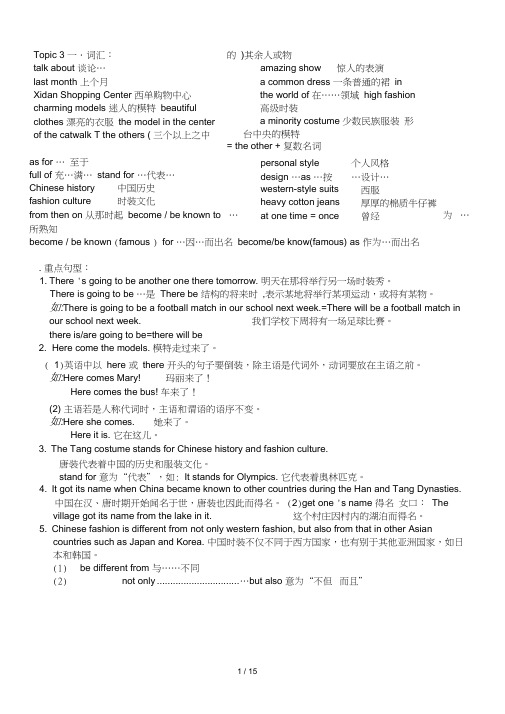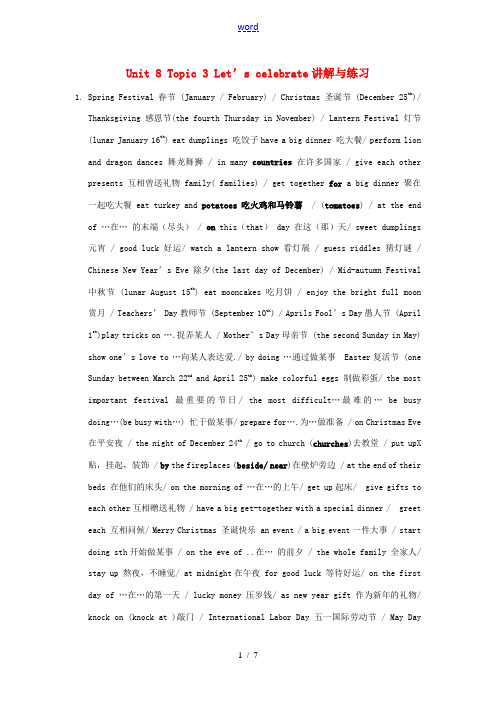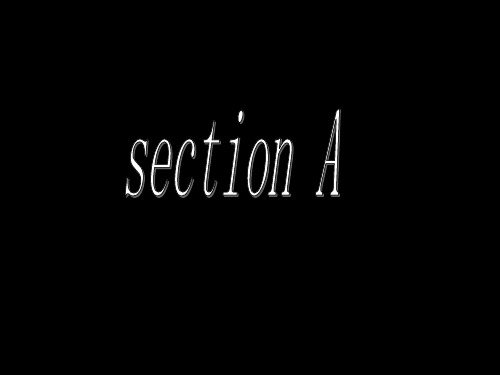Unit8Topic3基础知识过关
- 格式:doc
- 大小:31.50 KB
- 文档页数:3

Topic 3 一.词汇: talk about 谈论…last month 上个月Xidan Shopping Center 西单购物中心charming models 迷人的模特 beautifulclothes 漂亮的衣服 the model in the centerof the catwalk T the others ( 三个以上之中的 )其余人或物amazing show 惊人的表演 a common dress 一条普通的裙 in the world of 在……领域 high fashion 高级时装 a minority costume 少数民族服装 形台中央的模特 = the other + 复数名词as for … 至于 full of 充…满… stand for …代表… Chinese history 中国历史 fashion culture 时装文化 from then on 从那时起 become / be known to …为…所熟知become / be known (famous ) for …因…而出名 become/be know(famous) as 作为…而出名 . 重点句型:1. There 's going to be another one there tomorrow. 明天在那将举行另一场时装秀。
There is going to be …是 There be 结构的将来时 ,表示某地将举行某项运动,或将有某物。
如:There is going to be a football match in our school next week.=There will be a football match in our school next week. 我们学校下周将有一场足球比赛。
there is/are going to be=there will be2. Here come the models. 模特走过来了。

Unit8 Topic3 短语句型归纳●重点短语perform lion and dragon dances 舞龙舞狮watch lantern shows 观灯展guess riddles 猜谜Lantern Festival 元宵节Mid-autumn Festival 中秋节decorate …with …用装饰……go to church 做礼拜put up挂起;举起;贴(广告等〕stay up熬夜at midnight 在午夜lucky money 压岁钱knock on/at 敲hold races 举办竞赛National Day国庆节go up升起●必备句型1. They often eat turkey and Christmas cakes and give each other presents.2. People show their love for their mothers by giving cards and other presents.3. Christmas is the most important festival in many countries.4. Children put up stockings by the fireplaces or at the end of their beds before they go to bed.5. They usually greet each other and say, “Merry Christmas!〞6. In China, the Spring Festival is a big event.7. They stay up and enjoy dumplings at midnight for good luck.8. They are very happy to get lucky money from them.9. Then we knocked on our neighbors’doors and shouted, “Trick or treat!〞10. People can enjoy a one-day holiday, too.11. Many people go to Tian’anmen Square to wa tch the national flag go up.。

Unit 8 Topic 3 Let’s celebrate讲解与练习1. Spring Festival春节 (January / February) / Christmas圣诞节 (December 25th)/Thanksgiving感恩节(the fourth Thursday in November) / Lantern Festival 灯节(lunar January 16th) eat dumplings 吃饺子have a big dinner 吃大餐/ perform lion and dragon dances舞龙舞狮 / in many countries在许多国家 / give each other presents互相曾送礼物 family( families) / get together for a big dinner 聚在一起吃大餐 eat turkey and potatoes吃火鸡和马铃薯 / (tomatoes) / at the end of …在… 的末端(尽头) / on this(that) day 在这(那)天/ sweet dumplings 元宵 / good luck好运/ watch a lantern show看灯展 / guess riddles猜灯谜 / Chinese New Year’s Eve 除夕(the last day of December) / Mid-autumn Festival 中秋节 (lunar August 15th) eat mooncakes吃月饼 / enjoy the bright full moon 赏月/ Teachers’ Day教师节 (September 10th) / Aprils Fool’s Day愚人节 (April 1st)play tricks on ….捉弄某人/ Mother’s Day母亲节 (the second Sunday in May) show one’s love to …向某人表达爱./ by doing …通过做某事 Easter复活节 (one Sunday between March 22nd and April 25th) make colorful eggs 制做彩蛋/ the most important festival 最重要的节日/ the mos t difficult…最难的… be busy doing…(be busy with…) 忙于做某事/ prepare for….为…做准备 / on Christmas Eve 在平安夜 / the night of December 24th / go to church (churches)去教堂 / put upX 贴,挂起,装饰 / by the fireplaces (beside/ near)在壁炉旁边 / at the end of their beds 在他们的床头/ on the mor ning of …在…的上午/ get up起床/ give gifts to each other互相赠送礼物 / have a big get-together with a special dinner / greet each 互相问候/ Merry Christmas 圣诞快乐 an event / a big event一件大事 / start doing sth开始做某事 / on the eve of ..在… 的前夕 / the whole family 全家人/ stay up 熬夜,不睡觉/ at midnight在午夜 for good luck 等待好运/ on the first day of …在…的第一天 / lucky money 压岁钱/ as new year gift 作为新年的礼物/ knock on (knock at )敲门 / International Labor Day五一国际劳动节 / May Day五一节 / a seven-day holiday七天的假期 / go shopping 去购物/ go traveling去旅行 / Dragon Boat Festival龙舟节 / hold dragon boat races(hav e)举行龙舟赛 / in many places在许多地方/ rice dumplings 粽子/ the National Day国庆节 / the whole country全国,举国上下/ the birthday of … … 的生日 / the capital of ……的首都/ go to Tian’anmen Square去天安门广场 / watch the national flag go up看升国旗 / on the wall在墙上/ a must for……必备的事 / visit friends and relatives走亲访友 / give greets to each other 互相问候/2. Chinese people _______________(吃饺子) and _________________(舞弄舞狮)duringSpring Festival.3. People ___________(在许多国家) celebrate Christmas and __________(互赠礼物).4. Families in the U.S.A. _________________________________(聚在一起吃大餐 ).5. Many people eat _______(火鸡) and _______(土豆). Jim likes eating _______(西红柿).6. Lantern Festival means __________(春节的结束). ___this day, people eat ___(元宵) for ____(好运). ______________(看灯展) and ____________(猜灯谜).7. People have ____ and do not go to bed ___________(直到午夜) to wele the ______.8. _________(在中秋节), ___this day people ______(吃月饼) and _________(赏月).9. __________(在愚人节), Children and some young people _____________(捉弄朋友).10. ______(在母亲节), people ___their love ___ their mothers by ___(give) ___ andother ___.11. Many people ____(相信) Christ __________(复活) ________(在复活节). People_______(做彩蛋) _______(庆贺) the festival.12. Christmas is ________(最重要的) festival _________ (在许多国家)。

人教版八年级上册英语Unit 8 知识点过关卷Ⅱ.重点句子(10分)1.制作香蕉奶昔的第二个步骤是将香蕉切碎。
The second step of a banana milk shake is to the banana.2.去野餐前莉萨在她包里装满了食物和饮料。
Lisa her bag food and drinks before the picnic.3.别忘了加一些糖和盐。
Don't forget some sugar and salt.4.他们不知道做什么来感谢你的好意。
They don't know what to do to your kindness.5.我们常用最美味的食物来招待客人。
We usually the most delicious food the guests.6.这儿有一个为感恩节大餐制作火鸡的方法。
Here is one turkey for a Thanksgiving dinner.7.不要把鸡肉切成碎片。
Don't the chicken .8.全班都在努力准备下一次考试。
The whole class is for the next exam.9.把火鸡放进高温烤箱中烤几个小时。
the turkey in a and cook it a few hours.10.最后,别忘了关灯。
, don't forget the lights.二、单元基础知识过关Ⅱ.单项选择(10分)( )1.— Would you like some ?— Thank you. But I don't like it.A. bananasB. orangesC. hamburgersD. yogurt( )2. In China, it's for people to eat long noodles on the birthday. It's a symbol of long life.A. dangerousB. traditionalC. meaninglessD. possible( )3. The man some sugar the coffee so that it could taste sweet.A. put; atB. added; toC. poured; ofD. filled; with( )4.—_ sugar do we need?— We need sugar.A. How much; two teaspoon ofB. How much; two teaspoons ofC. How many; two teaspoon ofD. How many; two teaspoons of( )5. Let's go home as early as to enjoy zongzi with our family.A. ableB. necessaryC. possibleD. traditional( )6. Do you know to make noodles?A. howB. whatC. whichD. whom( )7. mix these things together.A. NotB. NoC. Don'tD. You aren't( )8.— What a high ! It's almost 38 Ⅱ.— Yes, it is usually very hot at this time of a year.A. buildingB. temperatureC. priceD. mountain( )9. Please the test paper your hand, or others can see your answers.A. cover; withB. fill; withC. cut; upD. turn; on( )10.— We' re having a party next Saturday, and I'd like you to come.— ! I'm having a meeting that day. Thank you all the same.A. I'm sorryB. Good luckC. Well doneD. Never do it againⅡ.根据句意及汉语或首字母提示完成单词(15分)1. Before you plant a tree, you need to (挖) a hole.2. For breakfast, she had only a slice of bread and (黄油).3. The old man is 70 years old. But nobody c the birthday for him every year.4. The restaurant s free apple juice to customers.5. There are some apples on the p .6. First, p two potatoes and cut them up.7. I'm hungry. Please give me two p of bread to eat.8. This dish takes 20 minutes to p and cook.9. People usually eat t on Thanksgiving Day in Western countries.10. I eat three m every day.11. Here is one w to solve this problem.12. To make a fruit salad, you need to m up all the fruit.13. Thanksgiving is a time to give thanks for food in the a .14. Turn on the b to make apple juice.15. Put the corn into the popcorn m .Ⅱ.用括号中单词的适当形式填空(15分)1. We need two ( spoon) of honey.2. My sister helped me ( pour) the water into the cup.3. Mary, I want to put some ( sugar) in the tea.4. Look! My mother ( peel) an orange for me.5. How many ( watermelon) do we need?6. I'm hungry. Please give me two ( piece) of bread.7. I like eating cakes with ( cheese).8. My father likes to keep some in the yard, because he likes to eata lot. ( chicken)9. Don't forget ( take) your homework home.10. After a long walk, they got there ( final).11. I need ( cook) by myself because my parents are out.12. The turkey is ( cover) with gravy now.13. We ( dig) a hole and planted the tree.14. Which is the best way ( make) turkey?15. I don’t know how ( plant) trees.Ⅱ.表达积累(10分)[主题:和同学一起做水果沙拉]根据所给汉语或首字母提示,写出空白处所缺单词的正确形式。


Unit 8What are the shirts made of?Section A (3a3c)基础知识必会清单及知识过关基础知识必会清单Ⅰ.核心词汇名词:1.产品;制品/ˈprɒdʌkt/ n.product2.小手提包n. handbag3.表面;表层/ˈsɜː(r)fIs/ n. surface4.材料;原料/məˈtIəriəl/ n. material5.交通;路上行驶的车辆/ˈtræfIk/ n.traffic6.邮递员/ˈpəʊstmən/ n. postman形容词:7.当地的;本地的/ˈləʊkl/ adj. local8.可移动的;非固定的/ˈməʊbaIl/ adj. mobile动词:9.避免;回避/əˈvɔId/ v. avoid短语:10.不论;无论no matterⅡ.重点句式1.如果你去另一个国家,你会买什么样的东西呢?If you go to another country, what kinds of things would you buy?2.他发现当地商店中如此多的产品是中国制造的很有趣。
He found it interesting that so many products in the local shops were made in China.3.他意识到美国人几乎无法避免购买中国制造的产品。
He realized that Americans can hardly avoid buying products made in China.4.康建认为中国擅长制造这些日用商品是很了不起的。
Kang Jian thinks it’s great that China is so good at making these everyday things.5.但是,他希望将来中国也能够更擅长制造高科技产品,人们在世界各地都能买到这些产品。
Unit 8 The Seasons and the WeatherTopic 3 Let’s celebrate!Section A 重点词组句子1.春节 the Spring Festival2.吃饺子eat dumplings3.舞龙舞狮perform lion and dragon dance4. 元宵节 the Lantern Festival5.吃汤圆eat sweet dumplings6.赏花灯watch lantern shows7.猜灯谜guess riddles on lanterns8.圣诞节Christmas Day9.互赠礼物give each other presents 10. 感恩节Thanksgiving Day 11.吃火鸡和南瓜饼eat turkey and pumpkin pie 12.中秋节 the Mid-autumn Festival 13.吃月饼eat mooncakes 14. 阴历八月十五lunar August 15th 15.欣赏明亮的圆月watch the bright full moon 16.母亲节Mother’s Day 17.教师节Teachers’ Day 18.复活节Easter Day 19.做复活节彩蛋make Easter eggs1.中国人吃饺子,舞龙舞狮。
Chinese people eat dumplings and perform lion and dragon dances.2.元宵节意味着春节的结束。
The Lantern Festival means the end of the Spring Festival.3.人们在这天吃元宵求好运,并看灯展和猜灯谜。
On this day, people eat sweet dumplings for good luck, watch lantern shows and guess riddles on lanterns.4.在美国,家人团聚,共享盛宴。
七下Unit8The seasons and the weather Topic3. Let’s celebrate!语言点解析SectionC-1aThe Spring Festival春节1.In China, the Spring Festival is a big event.在中国,欢庆春节是一件大事。
●Event n.“事件,大事;活动;运动项目”a big event一件大事2.People usually start preparing for the festival one month before it comes.人们通常提前一个月就开始为那个节日做准备。
start doing sth.开始做某事prepare for“为……做准备”开始为那个节日做准备start preparing for the festivalstart to prepare for the festival3.They prepare delicious food, and clean and decorate their homes. Theyalso buy somenew clothes. 他们准备美味佳肴,打扫并装饰房子。
他们也买一些新衣服。
(1)prepare delicious food准备美味佳肴●prepare 与prepare for的区别①prepare用作及物动词时:●prepare sth.表示"准备......",后接名词或代词作宾语。
后接直接准备的对象,谓语动作直接体现在宾语上.e.g. Mother is preparing lunch.(母亲正在准备午饭.)●prepare sb. sth. 表示"给......准备......",也可转换为prepare sth. for sb.●prepare to do sth.表示"准备做......"。
Unit 8 Topic 3一、重要句型1. They often eat turkey and Christmas cakes and give each other presents.= give presents to each othergive sb. sth = give sth to sb.类似的有:lend, send, bring, pass, takeE.g.: I lent my bike to her. = I lent her my bike.send sb. sth =sent sth to sb. 送给某人某物bring sb. sth = bring sth to sb. 给某人带来某物take sb. sth = take sth to sb. 给某人带走某物2. It means the end of Spring Festival. 它意味着春节的结束。
the end of …的末端;at the end of …在…的末端(时间和空间); by the end of 到…末端为止E.g. Mr. Wang lives at the end of Elm Road.Children put up stockings at the end of their beds.We can finish the work by the end of the year.3. not…until直到…才E.g. He came back after 12o’clock last night. (用not…until改写)He didn’t come back until 12 o’clock.4.prepare for sth 为某事做好准备=get sth ready ,其宾语为所准备的直接内容E.g They are preparing for the party this evening.The students are preparing for the exams.5.go to church 去教堂做礼拜; go to the church去教堂go to school 去上学;go to the school 去学校go to hospital去看病;go to the hospital去医院6.start/ begin to do sth; start/ begin doing sthE.g. He started/ began to study English six years ago.He started/ began singing.7.The whole family gets together for a big dinner.the whole +单数名词(集体名词) = all the +名词E.g The whole class is here. = All the class are here.The whole world likes football.8.watch sb. / sth do 看见某人/物做某事,表示动作的结果(全过程)watch sb./ sth doing看见某人/物正在做某事,表示动作正在进行类似的有:hear, seeE.g. I hear someone singing in the next room.I often hear him shout to others.I see an old man selling books in the street.I sometimes see them play basketball on the playground.二、英文书信的书写格式:(1)信头:指发信人的地址和日期,写在信纸的右上角,可以从靠近信纸的中央写起,信头上面需留空白,先写发信地址,且在地址下面写上日期。
Unit 8 Topic 3 基础知识周清
一.单词
1.决定于
2.纪律
3.调查
4.采访
5.普通的
6.便衣,便服
7.门卫
8.套装
9.服务员10.进去11.膝盖12.时机
13.正确地14.正文15.原因16.消防人员
17.温度18.天花板19.士兵20.官员
21.飞机场22.警官23.病人24.传播
25.每日的26.意见27.非常的28.北方的
29.随便的30.漂亮的31.长筒靴32.类似的,相像的
33.穿戴,穿衣
二.词组
1.计划做
2.我自己的
3.取决于
4.亲自
5.同意某人的看法
6.最好做某事
7.高兴做某事8.在岗位上9.执行特殊任务
10.遇到麻烦的人11.阻止某人做某事12.不得不做
13.这边请14.脱下,起飞15.保持安静
16.听老师讲课17.做运动18.遵守交通规则
19.保护...免受…的伤害20.看见某人正在做某事
21.在飞机场22.在街上23.在日常生活中
24.在每一个场合25.而且26.在春天
27.事实上28.取决于29.像…一样
30.和…一样
三.句子
1.你能告诉我王老师说什么吗?
2.她说学校计划为我们做校服。
3.这取决于谁来设计我们的衣服。
4.事实上得体的校服的确能显示出良好的风纪。
5.你最好调查一下校服中学生喜欢的风格。
6.在岗位上穿制服对你来说很重要?
7.你能告诉我你什么时候穿制服?
8.你能告诉我在这我应该穿什么吗?
9.你能告诉我哪里有舞鞋?
10.当你进入日本人家里时,应该先脱掉鞋子。
11.你怎么了(3)?
12.在正式场合穿牛仔裤是不礼貌的。
13.(对于我们来说)在会议上穿工作套装很合适。
14.在会议上我们穿工作套装很合适。
15.人们因不同的原因穿制服。
16.消防员们穿特制的外套,戴头盔是为了防止高温和坍塌的天花板伤害他们。
17当我们看到在飞机场上穿着制服的飞行员时,我们相信他们知道如何使飞机起飞。
18.当医生穿上制服时,病人会很容易找到他们。
19.不同的制服代表着不同的工作。
20.因此,在日常生活中了解不同的制服很必要。
21.你可能想了解北美人在工作和特殊日子里穿什么。
22.加拿大人和美国人像中国人一样,不但在更正式的的场合而且在办公室上班时通常也穿西服。
23.世界各地中城市的人们大多穿着类似的衣服。
课后反思:
本周的单词比较抽象,使用频率不高,学生掌握的不好,词组比较少写得很好,但是句子出错较多,主要还是由于对主句谓语动词为一班过去时的宾语从句掌握不好,但是想比较而言,2班写的比一班好。